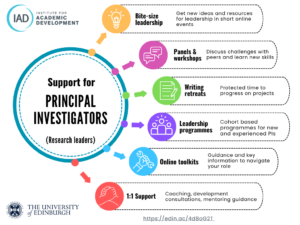The development of institution wide targeted training for PrincipaI Investigators (PIs) is a strategic objective of the University of Edinburgh, and a key deliverable in several research culture initiatives and action plans. To understand the needs and priorities of both institutional and individual PIs for training and development, between Aug 2023-Sep 2024 I conducted several stakeholder engagement activities. I spoke to senior leaders in all the Colleges and in other Professional Services to understand the institutional priorities, and conducted fifteen semi-structured interviews with PIs from across the institution. The aim was to gather data to address the following key questions:
- What are the definitions and typologies of PIs, and do they vary across the institution?
- What roles and responsibilities do PIs have, and do they vary across the institution?
- What are the institutional and individual PI needs and priorities for training and development?
- What support is already available at College and School level for PIs?
- What types of training and development are most beneficial or impactful for PIs?
- What would a successful PI programme look like, and how might this be evaluated?
In this blog I summarise the key outcomes and recommendations from stakeholders, and outline how this was used to inform the development of the IAD PI programme at the University of Edinburgh.
Key outcomes
- Typologies of PI varied hugely across the institution and varied by discipline and by experience level. The definition of a PI was largely based on having funding, having a team, or being independent in some way. However, it was important not to tie the definition of a PI to holding a grant or having a team, as this introduced a disciplinary bias. It was also important to include those who acted in the role of the PI without having formal titles, such as senior fellows, postdocs or staff in hybrid roles. A need for a definition that encompassed a wide audience was expressed.
- The role of the PI was very varied and was linked to the definition of the PI and the disciplinary norms, or the experience level of the PI. The key roles were delivering research projects and/or managing teams or individuals. Many felt that clarification of the expectations of the role would be useful to help manage workloads and to allow for better strategic planning, which was a key challenge for many.
- The key priorities for PIs for training were around improving management skills and improving navigation and guidance for complex governance and procedural requirements. The key issue for many was the heavy bureaucratic load and difficulties navigating procedures, which took up a lot of their time and reduced time for other important elements of their roles. Many also prioritised supports for management of teams and individuals, as this often took up a lot of their time but they felt least supported in this area. Some expressed a need to be better able to prioritise work and to have better clarification of the expectations of the role to allow them to strategically plan for their future and careers. Specific and targeted support for PIs was welcomed, as they felt their needs would be better met if training was specific to their roles and needs.
- School or local level support was primarily focused on grant capture and financial/budgetary support. Other support varied and some Schools had more developed programmes of support especially for the early career researchers. Management and leadership training was ad-hoc and most used central services for training in these areas.
- PI preferences for training were very mixed and were largely based on previous experience of training and development and the impact it had on their ability to perform their roles. A varied offer with a wide choice of how to engage was expressed, with both bite-size options and cohort-based programmes suggested. The breadth of suggestions for training encompassed a wide range of topics, mostly related to improving management and leadership of others, or improving efficiency and reducing time spent on tasks or better prioritisation.
- Measures of success of the programme were largely linked to behaviour changes or improved efficiencies, such as feeling happier in their roles and freeing up more of their time and energy for creativity. Measures also included more tangible outcomes like high attendance to events and clear and practical learning outcomes were also seen as important.
Actions
The key recommendations were implemented into the programme development as follows:
- The working definition of a PI will encompass a wide audience including those who act in the role of the PI or who are in hybrid roles and will not be dependent on someone having funding or managing a team or having formal titles. It will encompass the broad typologies of PIs across the institution and the many different roles and responsibilities they might have. The working definition is therefore, “A Principal Investigator or research leader is a staff member who is responsible for the intellectual leadership and overall management of a research project, who may lead or manage individuals or teams”.
- The key aim of the programme will be to provide targeted training and support for Principal Investigators (PIs) at a central level to improve research cultures and inclusive practices. The programme framework will be people-centered and focus on post-award leadership activities. There are four key competencies PIs will need to be effective research leaders; build positive research cultures, lead themselves and be self-aware, lead people and teams, and lead groups in projects and collaborations. The programme is underpinned by four key values that should ‘live’ in all their responsibilities; EDI, wellbeing, ethics & integrity, citizenship. There are three levels to their responsibilities; procedural, regulatory, and strategic, which they need to be able to navigate their roles. The whole programme sits within existing support for PIs at the University of Edinburgh and aims to complement these rather than duplicate efforts.
- The programme offer will consist of a variety of leadership development opportunities and additional support options for PIs at the University of Edinburgh. The offer provides a flexible and adaptable programme to suit individual needs and preferences for training and development and will include a mix of online and in-person opportunities. This will increase access to leadership development and provide targeted and specific support for PIs that suit individual needs (see image below for details).
- The approach to evaluation will use the Kirkpatrick model, which allows learning and behaviour change to be included in the evaluation process. A variety of mechanisms will be used to gather data on the impact of the programme, and evaluation will occur on a regular basis to continually inform the development of the programme. Future stakeholder engagement activities will also be repeated to ensure the programme meets the needs and expectations of the institution and of individual PIs.

For more information on the PI programme, click here
Next steps
From this initial development phase based on stakeholder recommendations, the next step is to evaluate the initial programme offer over the last academic year and use this data to set priorities for further development. Initial plans are to increase the leadership programmes we offer to include more for aspiring and more experienced PIs, and develop further online toolkits to further support PIs to navigate procedural requirements, expectations, and share best practice for key aspects of their roles. Many of these developments will continue to be informed by key stakeholders, and we will continue to engage with Schools and Colleges to ensure we create flexible resources that can be used and adapted for local needs wherever possible.
Emily Woollen is a Researcher Developer at the Institute for Academic Development, University of Edinburgh. She has been leading on the development and implementation of a PI training and development programme since Aug 2023. If you wish to discuss the development of the PI programme, or see a full stakeholder report, please contact Emily Woollen directly. Restrictions for wider sharing may apply (e.woollen@ed.ac.uk).


